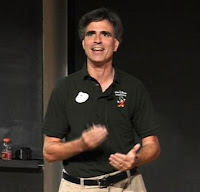
JF Hadley is a teacher of an all girls school in Philadelphia. She is a teacher of English and History. Ms. Hadley started a blog called
Middle School Matrix- Exploring the changing world of Middle School teaching and technology. I read some of her blog posts and choose these three to post about, global fun and laughter, inanimate objects=dinosaurs, and when the tech tool fails.
The first post is called, "
Global Fun and Laughter". This is about JF Hadley’s Personal Learning Network (PLN) and how it affected her classroom. As one of her networks that she uses for her PLN, she twittered to a teacher that was in Japan. This communication with text allowed them to share resources and information about the other county. To increase her student’s interest, the teacher from Japan sent samples of Japanese food for each of her students in the class. To continue to view other networks for her PLN, the Japan teacher sent her Skype address and got her connected. Now Ms. Hadley is able to put a face and voice to her teacher friends in other countries.
Since I am learning about my own PLN, it is nice to see how different teachers are able to have an outcome of experiencing food from Japan. I think that it would be a good idea to have teacher friends that are in other countries like that to send things like food and to also bring the United States to them. This is positive outcome for PLNs to have Twitter, and Skype as a network.
There was a post that Ms. Hahley posted titled, “
Inanimate Objects=Dinosaurs”. This post is about how her granddaughter was using her iPhone with an app called Bubbles. When she showed and instructed her granddaughter how to play the game and the little girl tried without success left the phone upset. She later came back with determination and took the phone and succeeded in playing the game. This made Ms. Hardley think about how children in the world today look towards devices like iPhones and computers that have touch and sound interactions.
This reminds me of how my daughter learned how to use my DVD player and iPod. She wound watch me use my fingers to activate the devices and when I turned away, she would play and work the devices herself. Now at two years of age, my daughter can change out and play DVDs in the player, turn on and off computers and televisions, and switch songs and turn up and down the volume on my iPod nano. She knows that by doing this, it will give her the outcome that she wanted, to watch Curious George.
The last post that I read was called, “
When the Tech Tool Fails”. Ms. Hahley did this post as a response to Jason Bedell’s help for his book. He was looking for teachers that had stories about technology tools that were used in the classrooms but failed to work. Ms. Hahley told him how she was going to use video camera to tape her students reenacting four events that lead up to the Revolutionary War. The movies would be with props and costumes. Both her and her students took more time in getting changed and trading props that it took too long to film. In the end, they stopped short and had to move on not finishing the project.
Ms. Hahley has said that this did not discourage her to continue to use movie making in her classroom, but taught herself that she should only use less events. I think that this project was a fun creative way for the students to learn. They have a way to be a part of the war like a reenactment. I would use her ideas as a fun activity to use team work while learning an important part of history.
















